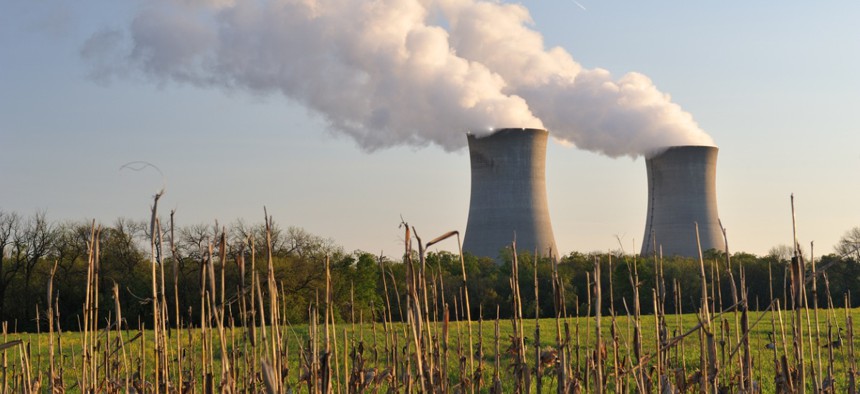Regulators Want to Know How AI Should (and Shouldn’t) Be Used In Nuclear Power Plants

Farm field and chimneys of Nuclear Power Generation Station at Pottstown, PA, USA aimintang/istockphoto
The Nuclear Regulatory Commission put out a call for feedback on using artificial intelligence and machine learning to improve the safety and reliability of the grid.
As advanced algorithms—often referred to as artificial intelligence technologies—are finding utility in just about every sector, federal nuclear regulators wants to know how AI and machine learning tools can improve the reliability and safety of nuclear energy production.
The Nuclear Regulatory Commission plans to post a notice Wednesday in the Federal Register soliciting public input on how AI and ML technologies are currently being used in nuclear power operations, as well as “future trends” on the horizon.
Specifically, the commission wants feedback on “the state of practice, benefits and future trends related to the advanced computational tools and techniques in predictive reliability and predictive safety assessments in the commercial nuclear power industry.”
The request for comment includes 11 questions designed to help the commission understand where and how these tools are being used and the benefits—including potential cost savings—and risks:
- What is status of the commercial nuclear power industry development or use of AI/ML tools to improve aspects of nuclear plant design, operations or maintenance or decommissioning? What tools are being used or developed? When are the tools currently under development expected to be put into use?
- What areas of commercial nuclear reactor operation and management will benefit the most, and the least, from the implementation of AI/ML? Possible examples include, but are not limited to, inspection support, incident response, power generation, cybersecurity, predictive maintenance, safety/risk assessment, system and component performance monitoring, operational/maintenance efficiency and shutdown management.
- What are the potential benefits to commercial nuclear power operations of incorporating AI/ML in terms of (a) design or operational automation, (b) preventive maintenance trending, and (c) improved reactor operations staff productivity?
- What AI/ML methods are either currently being used or will be in the near future in commercial nuclear plant management and operations? Example of possible AI/ML methods include, but are not limited to, artificial neural networks, decision trees, random forests, support vector machines, clustering algorithms, dimensionality reduction algorithms, data mining and content analytics tools, gaussian processes, Bayesian methods, natural language processing, and image digitization.
- What are the advantages or disadvantages of a high-level, top-down strategic goal for developing and implementing AI/ML across a wide spectrum of general applications versus an ad-hoc, case-by-case targeted approach?
- With respect to AI/ML, what phase of technology adoption is the commercial nuclear power industry currently experiencing and why? The current technology adoption model characterizes phases into categories such as: the innovator phase, the early adopter phase, the early majority phase, the late majority phase, and the laggard phase.
- What challenges are involved in balancing the costs associated with the development and application of AI/ML tools, against plant operational and engineering benefits when integrating AI/ML into operational decision-making and workflow management?
- What is the general level of AI/ML expertise in the commercial nuclear power industry, e.g. expert, well-versed/skilled, or beginner?
- How will AI/ML effect the commercial nuclear power industry in terms of efficiency, costs, and competitive positioning in comparison to other power generation sources?
- Does AI/ML have the potential to improve the efficiency and/or effectiveness of nuclear regulatory oversight or otherwise affect regulatory costs associated with safety oversight? If so, in what ways?
- AI/ML typically necessitates the creation, transfer and evaluation of very large amounts of data. What concerns, if any, exist regarding data security in relation to proprietary nuclear plant operating experience and design information that may be stored in remote, offsite networks?
The NRC is looking for responses within 30 days of the post going live in the Federal Register, May 21.
“Comments received after this date will be considered if it is practical to do so,” the notice states, “but the commission is able to ensure consideration only for comments received on or before this date.”






